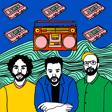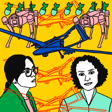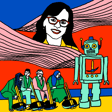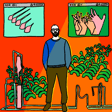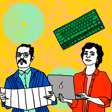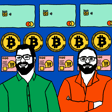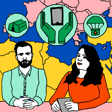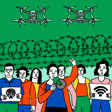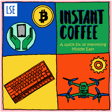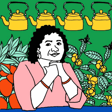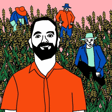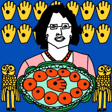Become a Creator today!Start creating today - Share your story with the world!
Start for free
00:00:00
00:00:01

1.5. Technology and activism in Palestine with Salem Barahmeh
On the fifth episode of Instant Coffee, LSE Middle East Centre's Muna Dajani talks to Salem Barahmeh about technology and activism in Palestine. Salem is Executive Director of the Palestine Institute for Public Diplomacy (PIPD) and an advocate for Palestinian freedom and rights. You can find the PIPD on: Facebook: www.facebook.com/ThePIPD/ Twitter: twitter.com/thepipd Instagram: www.instagram.com/thepipd/?hl=en Youtube: www.youtube.com/channel/UCI1faJEQ…PLIBIS-g/featured
Transcript
Introduction to Palestinian Strategy
00:00:00
Speaker
The idea of international solidarity and shaping public opinion has been such a fundamental part of Palestinian national strategy since the inception of our struggle. Because of the symmetry of power between us and the oppressor, we always felt the need to ensure that we have the support of the world. This is Instant Coffee, a new podcast brought to you by the LSE Middle East Center and produced by me, Nadine Almanasti and me, Ribal Sleiman Haydar.
Role of Technology in Activism
00:00:30
Speaker
On this episode, Mona Dajani talks to Salem Barahameh about technology and activism in Palestine. Mona is research officer at the LSE Middle East Center. Salem is executive director of the Palestine Institute for Public Diplomacy and an advocate for Palestinian freedom and rights. Over to you, Mona.
00:00:49
Speaker
Hi, Salim. Thank you for joining us today. How are you? Hi, Munet. It's lovely to be with you. How are things? Everything's okay considering the situation. Well, thank you for joining us today.
Evolution of Palestinian Activism
00:01:01
Speaker
We're really looking forward to speak about tech and activism in the Palestinian context, speak about the great work that you're doing, and learn more about activism and tech in Palestine.
00:01:15
Speaker
Welcome. So let's talk today about Palestine Institute for Public Diplomacy. And I wanted to first ask you like, today, Palestinian activism has gone through different stages of development and a lot of kind of setbacks, let's say. And what is the role today of the new generation in reigniting a Palestinian activism? And can you tell us a bit about the Palestine Institute for Public Diplomacy?
00:01:45
Speaker
Thanks, Munna. I think to understand what we do at PIPD, it's very important to understand the context of the Palestinian national movement. I think for young Palestinians, the younger generation, we look around the world and we are extremely frustrated with the way our movement is understood, our struggle for freedom and rights is understood, and what we aspire to and how our story is told. And we feel like there has been a very big failure from the generation that has come before us.
00:02:13
Speaker
And so as a group of young Palestinians, we started PIPD in the hope of communicating a new story about Palestine to the world, one built on the progressive values of freedom, justice, equality, and rights, and doing it through new means. The idea of international solidarity and shaping public opinion has been such a fundamental part of Palestinian national strategy since the inception of our struggle.
00:02:40
Speaker
Because of the symmetry of power between us and the oppressor, we always felt the need to ensure that we have the support of the world. But we felt that the message and the messenger and the way that message was delivered was extremely outdated and no longer reflected how we saw the world.
00:02:58
Speaker
So at PIPD we developed and married technology with our form of activism and being able to present this new story based on these progressive values and highlighting different voices of those that have not been heard from the ground in Palestine, but also all around the world.
00:03:16
Speaker
whether it's through social media, whether it's through different campaigns, whether it's bridging networks of fragmented Palestinian communities, or it's projects like Palestine VR. And to date, our campaigns and our work have reached more than 110 million
00:03:33
Speaker
people in many different languages in the last three years since we started. And our ethos is to try to reach beyond the echo chamber of Palestinian solidarity movements abroad. For us we see that our national struggle is very much contingent on bringing societies with us.
00:03:52
Speaker
And without being able to communicate to the majority of societies, I don't think we're doing our job just right.
Impact of Palestine VR
00:03:59
Speaker
So that's kind of the fundamental North Star of PIPD through the younger generation that sees a different future and a different way of being able to connect with people all over the world.
00:04:11
Speaker
Great, that sounds really inspiring and just a much-needed kind of boost to decades of solidarity work in Palestine. And if you can tell us a bit more about Palestine VR, how did the idea come about, who led on it, and how has it been seen, and how do people find it when they experience Palestine in virtual reality?
00:04:41
Speaker
Yeah, no, Palestine VR was a very useful tool that grew out of the inability of two members of Congress, Rashid Atleb and Ilhan Omar, from visiting Palestine because Israel barred them from entering. And so we basically took their tour, their itinerary, and turned it into a virtual reality one that they could access, but then to make more widely available to everyone.
00:05:08
Speaker
And the understanding we're operating under is that you cannot fully understand what it's like to live the reality in Palestine under oppression, discrimination, displacement, and apartheid without seeing it. Nobody comes and leaves the same way. I don't care what your political views are.
00:05:28
Speaker
And so we felt like we needed to develop a tool that allowed people to transport themselves to Palestine because millions will not go. They just don't have the time or the luxury to go. And millions cannot, like many Palestinian refugees. And for us, it's also to be able to connect them to their homeland.
00:05:46
Speaker
And so since we launched last winter, the app has been downloaded more than 20,000 times. And we've led a lot of different events in different parts of the world, starting with Europe, to be able to engage different audiences and new audiences on Palestine through technology, but again, based very much in the rights-based and the values-based approach and discourse.
00:06:13
Speaker
And one of the most interesting experiences I had with Palestine VR was in Germany actually, where at the moment the word Palestinian or Palestine is extremely radioactive. You can't rent out a venue for a Palestinian cultural movie night.
00:06:29
Speaker
So a part of what we were doing is trying to reach out to youth parties in German politics to be able to expose them to Palestine in different ways. And one of the parties we sat with, the Youth Wing, was extremely hostile to Palestine and a lot of our issues. And after two hours of being able to transport themselves to Hebron to see the segregation there or to Bethlehem to either refugee camp and see the wall and how it affects Walter or Hanil Ahmar in the Jordan Valley or Jerusalem,
00:06:58
Speaker
They said to us, we feel like we've been lied to our entire time, our entire life and our party is not allied with the values that it seeks to uphold. And that was the cognitive dissonance that we saw unfold from seeing the reality for yourself.
00:07:16
Speaker
and from hearing it from a direct source for a very long time.
Challenges in Digital Advocacy
00:07:21
Speaker
And I think this is, just to go back to the initial question, this is the beauty of technology. Technology can be a very powerful disruptor in who controls what message and what narrative is available to people.
00:07:33
Speaker
And for a long time, we didn't have those means to be able to tell our own story. And whether it's the Palestinian VR or other forms of technology, we're breaking new ground and we're reaching millions more in a very authentic, nonapologetically Palestinian narrative. And we're seeing a bit of the impact and it's great, but it's work that's going to take a long time and a lot of effort to really make a big impact.
00:08:01
Speaker
Great, Salim, that's great. I wanted to ask you more about Palestine VR and specifically about the audience. Who is Palestine VR kind of focused on? Because usually we always go to the West to kind of raise awareness about what's happening in Palestine. And yet a lot of time we don't go inwards. And understanding the fragmentation of Palestinian society is that we need to reach out to Palestinians beyond the geographic location.
00:08:30
Speaker
So how do you actually do that with how do you actually utilize Palestine VR to reach out to Palestinian in the diaspora Palestinian refugees everywhere who don't who have been denied the right to to live in their homeland and to even visit it.
00:08:45
Speaker
That's a really important question. I think when you look at what strengths we have as a people and as a national movement, it's very much 13 million of us all around the world. And for so long, the Palestinians that are living in refugee camps or Palestinians living in the diaspora have not been part of the Palestinian political system and have not
00:09:11
Speaker
been afforded the right to shape where we want to go and how we get there. And so there's almost a disconnect. And so I think for us as a younger generation of Palestinians, we really feel the need to break a lot of the fragmentation that accelerated under Oslo and was essentially a product of the PLO becoming defunct and that political system no longer existing.
00:09:38
Speaker
And so through Palestine VR, we want to be able to allow Palestinians, whether in those refugee camps or in the diaspora, to reconnect with their home. And it's our form of, or one form of, you know, trying to dismantle the political and identity fragmentation that Israel has imposed
00:09:58
Speaker
on us all around the world. And I think in terms of being able to mobilize and to get people engaged and involved, there's no better place to start than with Palestinians abroad. And that's something that's been neglected for so long. And we hold events often when we travel. We seek out the Palestinian community there.
00:10:21
Speaker
We hold Palestine VR events there and be able to connect with them, not just about the technology and through the technology, but also have very meaningful conversations about what together we can help shape the future and what that might look like and how can that be inclusive of Palestinians in Palestine and Palestinians abroad. Similarly, the Palestinian refugee camps, whether it's Lebanon or Jordan,
00:10:44
Speaker
I haven't had the chance to visit, for example, the refugee camps in Lebanon, but I know a lot of Palestinians there were able to connect to Palestine through VR and visit Jerusalem for the very first time and walk through the streets. And that's something that made them extremely emotional. But even for Palestinians within Palestine, I grew up in the West Bank. I've never been to Gaza.
00:11:06
Speaker
And my first time visiting Gaza and the beach in Gaza was through Palestine VR, and that made me extremely emotional. Similarly, my grandfather, he hadn't been to Gaza since the 70s. And his ability to go back to the markets in Gaza and recognize some of them after so many years was also quite powerful.
00:11:26
Speaker
So I think it tries to bridge the disconnection and the disconnect we've had from one another because of the political circumstances, whether imposed on us, or to some extent, whether they're our own doing as well from our leadership. And that's one way to tie the 13 million of us together again.
00:11:43
Speaker
That's very powerful and really like innovative. But what does Palestine VR promise after the experience? So when you actually go through that experiential journey and you see Palestine, are you offering any type of kind of follow up or how do you actually document the whole experience? It would be nice to see what can come up after you do the VR experience.
00:12:11
Speaker
Absolutely. We're a campaign and advocacy organization first. For us, we do want to raise awareness about Palestine, introduce the new narrative, be able to connect with people around the world, but ultimately we want to mobilize people to affect policy and political change.
00:12:28
Speaker
Right. And so for them, for us, Palestine VR is a tool to experience what the reality on the ground is like or connect Palestinians with their homeland. But that's only one step of the journey. The rest of the journey is OK, how then we work together to affect change, whether it's political change in Palestine or it's legislative legislative or political change in London or Paris or Berlin or D.C. or elsewhere.
00:12:55
Speaker
Right? Because sadly, Muna, you know this well, our lives, our freedoms, our rights, including the right of the return, is at the mercy of governments around the world. And for so long, they haven't held Israel accountable. And then the governments themselves haven't been held accountable.
00:13:14
Speaker
So the theory of change is then how can you put pressure on those governments to have a foreign policy or have legislation that is in accordance with these values that we want to promote and ones that recognize Palestinians as a people that deserve individual but collective self-determination and the full spectrum of rights, right?
00:13:39
Speaker
the push for change needs to be within those countries as much as it needs to be within historic Palestine itself.
00:13:47
Speaker
Great yeah and on that point I think kind of how do we actually move from kind of the more conventional campaigning advocacy work that has been done for decades many attempts have failed or many attempts haven't reached out to the right audience to the decision makers who are actually as you say like making decisions on behalf of Palestinians for so long and I just wanted to ask you kind of in this spirit on and kind of the wave of
00:14:15
Speaker
tech activism. Where is Palestine today in that scene, especially in light of the high surveillance and monitoring of Palestinian activity online on different social platforms? Where is Palestinian activism in the cyber world today? It's a very big question. I'll try my best to answer it.
00:14:40
Speaker
We're trying to navigate the cyber world and try to marry the world of activism and technology as much as we can, but I think, again, we're up against quite a bit. Israel is a leader in tech, it's a leader in surveillance, it's a leader in weapons and all forms of things.
00:15:03
Speaker
you know, we don't operate in a vacuum. And so, again, you know, when we talk about Facebook or Instagram or Twitter, these are not neutral platforms, right? These are platforms with their own political agendas. And you find often that, you know, your posts or your ads, etc., are taken down for different reasons. I mean, one example is Belle Hadid. She posted a passport of her father with
00:15:28
Speaker
the birthplace being Palestine and that was taken down for different reasons. But the point is this, the point is that there's a shrinking space in the cyber world. And even though we're relatively new to it as activists, we're feeling the effects of it, whether it's through the social media and social network platforms or otherwise. And so, yeah, it's a blessing, but it's also a curse.
00:15:57
Speaker
And the way we navigate it is going to be hard. And that goes in Palestine, whether you write a post that's critical of whether it's the own leadership, your own leadership, or Israel, you might be arrested and there are severe consequences for that. Or if you're trying to communicate from Palestine to the world, there are a lot of issues that you have to navigate and a lot of challenges that make it very hard.
Conclusion and Further Resources
00:16:24
Speaker
And again, Israel and its allies around the world have quite the network on the cyber front, and that's quite a big and powerful foe to engage with as well.
00:16:37
Speaker
Sure, that's a great point, Salim. And I just wanted to also talk about the great impact that PIPD is doing online. I follow you on Instagram and on Facebook and other platforms. And the great thing is the fact that also you're humanizing Palestinian and the Palestine struggle in a way that also educates and raises awareness.
00:17:00
Speaker
while at the same time, you know, also giving the big picture. And I really, I think that's a great, great initiative and a great way forward for Palestinian presence online, sort of a new frontier of activism and advocacy work. Thank you, Mila, I really appreciate it. Thank you for taking the time to chat. It's been a pleasure. Thank you, Salim, so much and keep up the great work.
00:17:27
Speaker
Thank you for listening to Instant Coffee, your quick fix of everything Middle East. Join us every Friday for a new episode of Instant Coffee where we interview artists, activists, writers, journalists and more from the region. To learn more about the Palestine Institute for Public Diplomacy and Palestine VR, follow the links in the podcast description. Don't forget to find us on Twitter, Facebook and Instagram. Until next time.
